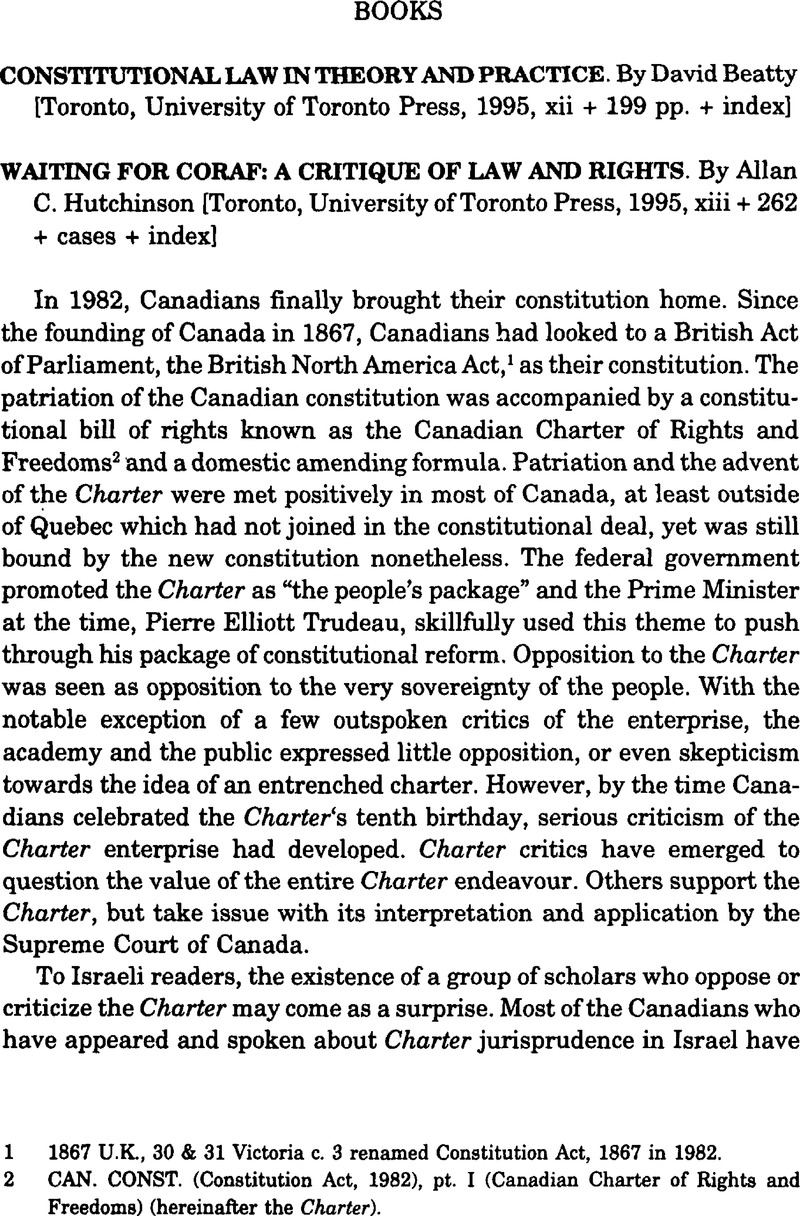No CrossRef data available.
Article contents
Constitutional Law in Theory and Practice. By David Beatty [Toronto, University of Toronto Press, 1995, xii + 199 pp. + index] - Waiting for Coraf: A Critique of Law and Rights. By Allan C. Hutchinson [Toronto, University of Toronto Press, 1995, xiii + 262 + cases + index]
Published online by Cambridge University Press: 04 July 2014
Abstract

- Type
- Books
- Information
- Copyright
- Copyright © Cambridge University Press and The Faculty of Law, The Hebrew University of Jerusalem 1995
References
1 1867 U.K., 30 & 31 Victoria c. 3 renamed Constitution Act, 1867 in 1982.
2 CAN. CONST. (Constitution Act, 1982), pt. I (Canadian Charter of Rights and Freedoms) (hereinafter the Charter).
3 For explanation of the Israeli adoption of Canadian Charter principles in these basic laws see Kretzmer, David, “The New Basic Laws in Human Rights: A Mini-Revolution in Israeli Constitutional Law?” (1992) 26 Is. L.R. 239, at 246Google Scholar. Professor Kretzmer expands on the Canadian connection in an article of the same name contained in Zamir, and Zysblat, , eds., Public Law in Israel (Oxford: Oxford University Press, forthcoming 1996)Google Scholar.
4 See especially Glendon, Mary Ann, Rights Talk: The Impoverishment of Political Discourse (1991)Google Scholar. See also Scheingold, Stuart, The Politics of Rights (1974)Google Scholar.
5 [1986] 1 S.C.R. 103. In later cases, the court deviated from the strict application of the standard it had set out in this case. See R. v. Edwards Books and Art, [1986] 2 S.C.R. 713 and R. v. Keegstra, [1990] 3 S.C.R. 697.
6 Section 8 of the Basic Law provides: “The rights according to this Basic Law shall not be infringed except by a statute that befits the values of the State of Israel and is directed towards a worthy purpose, and then only to an extent that does not exceed what is necessary”. (1992), 26 Is. L.R. 248, at 249Google Scholar. S.H. (17th March 1992).
7 Beatty, David, Talking Heads and the Supremes: The Canadian Production of Constitutional Review (1990)Google Scholar.
8 I could easily produce any number of enigmatic passages, but I will offer a single one for the reader. “A concern for dialogic authenticity cuts across a Dworkian deontological preoccupation with speaker autonomy and a Meilkejohnian functional concentration on audience interests”. Waiting for Coraf, p. 212.
9 Professor Hutchinson's Osgoode Hall colleague, Michael Mandel, has also written a no-holds-barred socialist critique of the Charter. See Mandel, Michael, The Charter of Rights and the Legalization of Politics in Canada (2nd ed., 1994)Google Scholar.
10 The most well-known American attempts at constructing a neutral theory of constitutional interpretation are Wechsler, Herbert, “Toward Neutral Principles of Constitutional Law”, (1959) 73 Harv. L. R. 1CrossRefGoogle Scholar and Ely, John Hart, Democracy and Distrust (Cambridge: Harvard University Press, 1980)Google Scholar. For comprehensive Canadian theories of judicial review, see Fairley, , “Enforcing the Charter: Some Thoughts on an Appropriate and Just Standard for Judicial Review”, [1982” Supreme Court L. R. 217Google Scholar; Monahan, , “Judicial Review and Democracy: A Theory of Judicial Review”, (1986) 21 U.B.C. L.R. 87Google Scholar.
* B.A. (McGill 1992), J.D. (Harvard 1995). The author is a Fulbright Scholar researching constitutional law in Israel. The author extends his thanks to Bruce Elman, Eric Fisher and Allen Zysblat who read drafts of this review and provided helpful comments.




